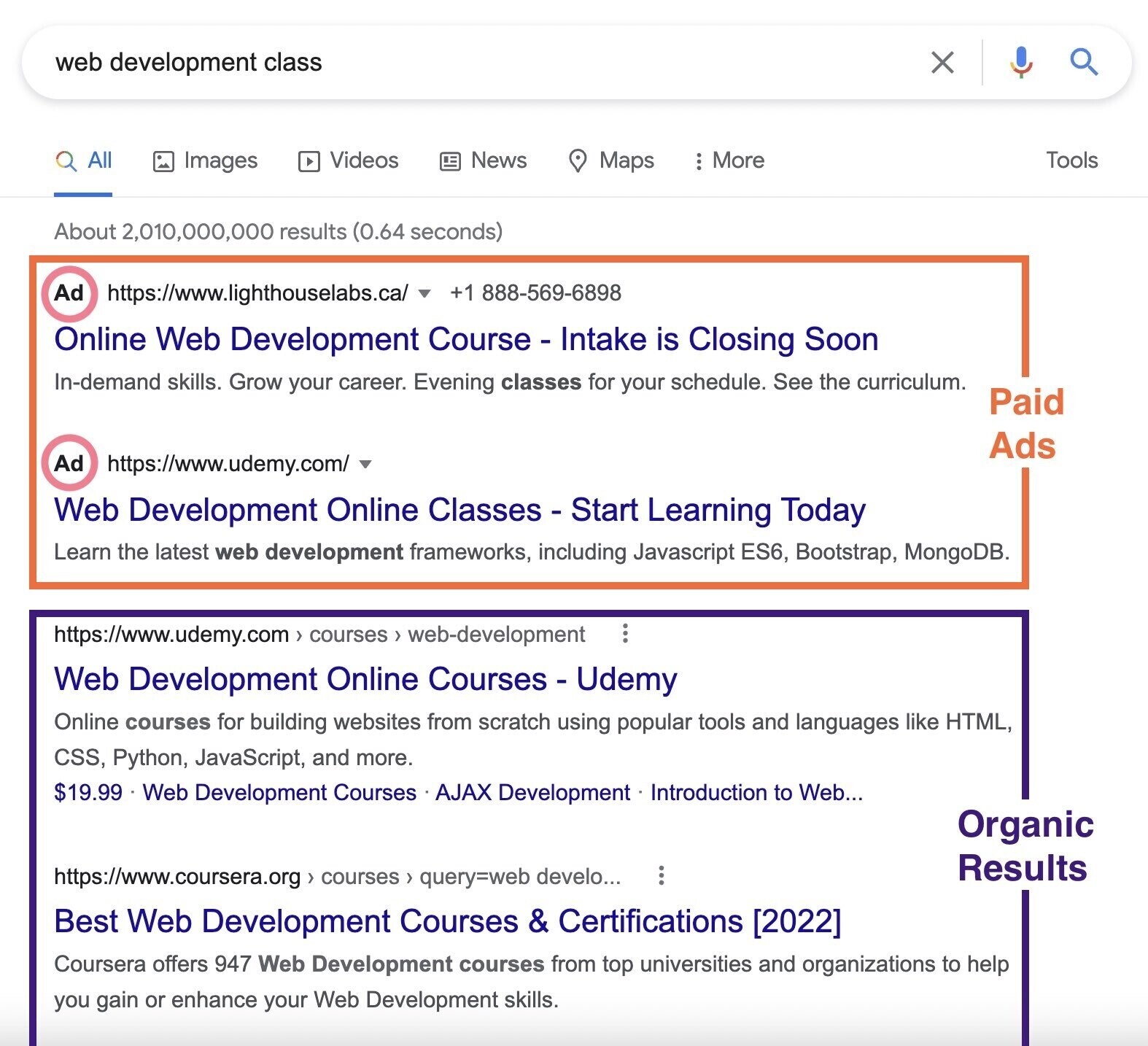SEARCH ENGINE MARKETING:
Search engine marketing (SEM) refers to the practice of promoting websites by increasing their visibility in search engine results pages (SERPs) primarily through paid advertising, but it can also include SEO.
With paid advertising, your website ranks in paid results. Whereas with SEO, it ranks in organic results.
Like this:

In this article, we’ll cover:
- How search engine marketing works
- How ad auctions work
- SEM best practices
Let’s get started.
SEM vs. SEO
SEM is a digital marketing strategy used to increase your site's visibility in search results. This can include both paid and organic (SEO) efforts.
While SEM broadly covers more than just paid marketing, it’s often also referred to as pay-per-click (PPC) marketing. This is a business model where marketers pay each time someone clicks their ad.
SEO, on the other hand, refers to organic results—i.e., “free” traffic as a result of providing relevant, useful content that ranks well on Google.
An effective SEO strategy can help you earn long-term traffic, while search engine ads can help improve your visibility and earn clicks from people ready to buy your product.
While SEM is a nuanced term, we’ll focus on using it to reference a paid search strategy from here on out.
How Does Search Engine Marketing Work?
SEM can be a powerful way to reach new customers and drive revenue because it ranks your site above organic results on the SERP.
Just look at the SERP for “meditation apps.” Headspace ranks first organically, but also holds the top Google ad spot:

You may be wondering why they’re bidding on the keyword if they already rank organically.
The reason is simple: they take up more real estate on the SERP this way. And even if their organic rankings fluctuate, they still have a chance to appear at the top of the page.
It’s especially important to hook users from the top of the SERP if they’re ready to buy. Otherwise, they may choose the easiest, most visible option (which may be your competitor’s ad).
But for your site to appear at the top of the SERP, you’ll need to win an ad auction.
To secure coveted paid ad spots at the top of the SERP, advertisers bid on keywords. Whoever wins the auction gets the top spot.
For our purposes, let’s cover how bids work in Google Ads.
To enter an ad auction, you’ll need to identify two important things:
- The keywords you want to bid on
- How much you’re willing to spend per click for each keyword
To identify the right keywords to bid on, use Semrush’s Keyword Magic Tool.
Open the tool, enter a word or phrase that’s relevant to your business, and hit “search.”

You’ll see potential keyword ideas for your PPC campaigns. Not all of these will make sense targeting with your ads.

Generally, you’ll need to choose the ones that are likely to convert. We cover how to make smart keyword choices later in this guide.
Now, in terms of how much you’re willing to spend per click for each keyword, the right price will depend on your industry.
For example, the average CPC for insurance and legal is higher than less competitive niches like home and garden.
Learn more about some of the expensive industries here.
Once Google determines that the keywords you bid on appear in users’ search queries, your ads will be entered into the auction.
Ads will only appear on searches with enough commercial intent (i.e., users are ready to buy). Like the ad for Headspace above—people are ready to buy a subscription.
Whereas informational searches like “what is copywriting” only display organic results:

There are also several factors that influence whether or not your ad will win the bidding, even if it’s a good fit for the keyword.
Here’s how Google decides which ad will win.
According to Google Ads guidelines, there are five main factors that they consider during an ad auction:
- Maximum bid: The maximum amount you're willing to pay for a click on your ad
- Quality Score: The formula that Google Ads uses to determine the relevance of your ad, or how useful it will be for the user
- Impact of ad extensions: The additional information you provided in your ad (phone number, links to specific pages, etc.)
- Ad rank: Ad rank is a combination of your bid and the quality of your ad and landing page. Google requires ads to meet a minimum quality threshold in order to be shown in a higher position.
- Ad context: When calculating ad rank, Google takes context into account. This includes the search term used, the user’s location, the time of search, the device used, and more.
Pro tip: You can monitor—and work to improve—your Quality Score in your Google Ads account.
The maximum bid refers to Google’s automated bidding strategies, which you have full control over. The same is true for ad extensions that might impact your ad performance.
The Quality Score, however, is a number between 1-10 assigned to you by Google. And it’s the reason why your ad only wins auctions for relevant queries.
The Quality Score is the gatekeeper of PPC advertising—it ensures that the ads users see are helpful and relevant.
If your ad matches too many irrelevant or generic queries, the costs of your paid search will rise exponentially.
This can damage your return on investment (ROI), and likely won’t yield the results you hoped for.
